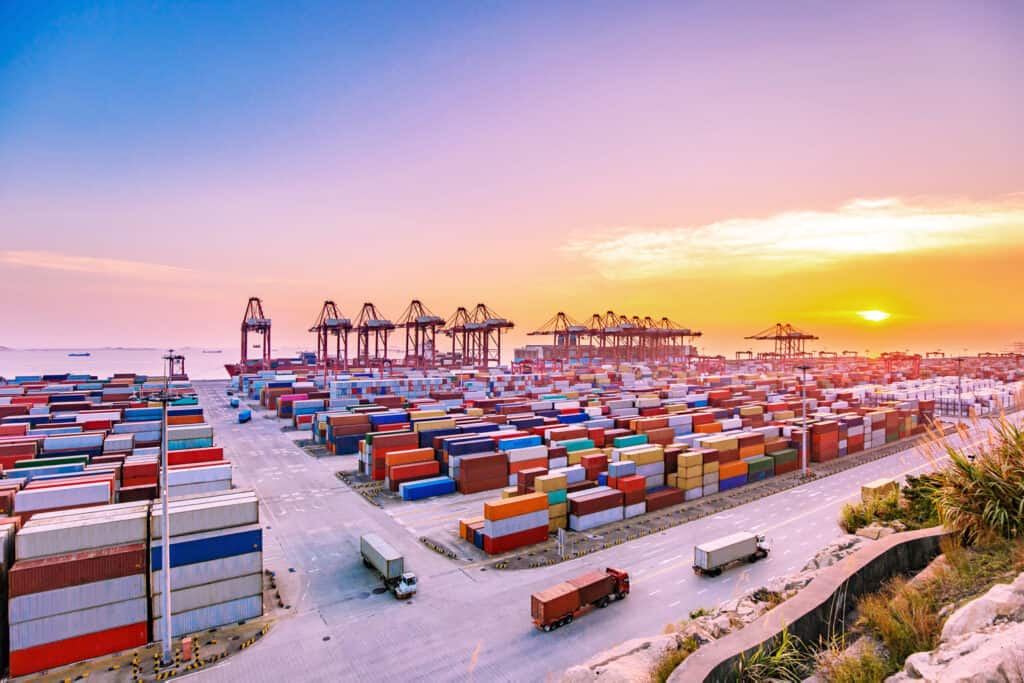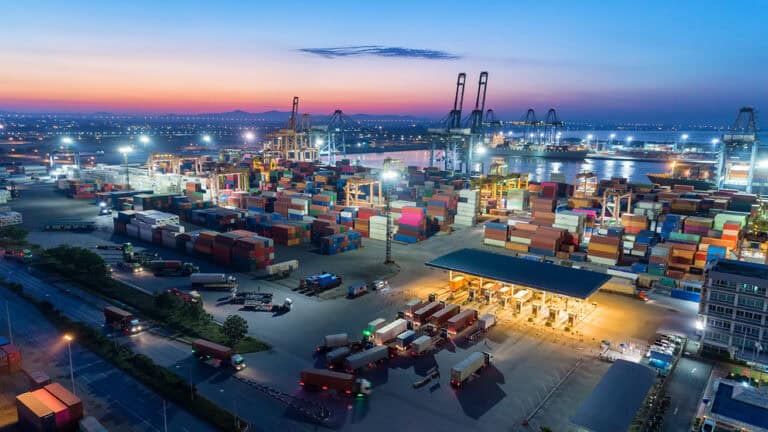
As the head of the product marketing team at e2open, I have the pleasure of collaborating with a fantastic group of subject matter experts. I want you to imagine we’re all fishing on the lake together, and someone asks the group a question. Each will provide their own view from their area of expertise – supply management, logistics, global trade, and planning. This article differs from our usual thought leadership pieces because I asked each team member to answer two questions, and we’re presenting their responses here in this more conversational format.
Let me start by saying we are in an era where the only constant is change, and the global supply chain landscape is no exception. Social, economic, and political shifts are reshaping supply chain strategies – from logistics disruptions and geopolitical tensions to innovation-transforming businesses. Then, of course, there is the two-letter word taking the world by storm – AI!
We share our insights into trends impacting each functional area of supply chains and how e2open’s solutions address these challenges. We’re only scratching the surface on these topics to keep it digestible, but we’ve included links to other thought pieces for you to learn more.
The 2023 supply chain experienced continued disruptions and changing dynamics. Companies faced challenges from political unrest, extreme weather, and inventory shortages to economic instability. The traditional supply chain landscape was reshaped by the change in consumer demand, labor shortages, and logistical hurdles. Whether you were the end consumer or a global supplier, heightened regulations and a focus on eradicating forced labor have transformed the supply chain entirely.
Mike Hitmar, Senior Director – Planning
What are three major trends in global supply chains impacting your functionality area, and how can these be addressed with e2open solutions?
- The hype around Gen AI has brought artificial intelligence into the spotlight, making it more widely accepted and recognized in supply chain management. In 2024, supply chain planners will adopt AI solutions that have a proven track record of creating value, automating workflows, and proactively addressing factors that impact supply and demand.
- As trade regulations become stricter and more enforceable, brand owners face increasing pressure to ensure that their entire value chain operates responsibly. Supply chain planners must consider regulatory requirements and compliance risks when creating supply and demand plans to safeguard the organization.
- Global conflicts, macroeconomic trends, supply disruptions, and logistical challenges continue to cause fluctuations in consumer demand patterns. This limits the effectiveness of historical data to predict demand. Planners must augment or replace legacy tools and processes to incorporate new sources of demand data, understand actual supply capacity, and real-world lead times to develop accurate and feasible plans that drive the organization’s success.
Write a sticky note for your desk or monitor with a word or phrase you want to be cognizant of. What is that?
- Expect the unexpected
Nicole Hudson, Director – Logistics
What are three major trends in global supply chains impacting your functionality area, and how can these be addressed with e2open solutions?
- One major trend that we see for logistics is the impact of ocean shipping lane risk and restrictions. The ongoing threats to ships transiting the Suez Canal and the restrictions on the size and volume of ships sailing through the Panama Canal are causing companies to seek alternate routes and service levels. E2open clients have access to the largest network of ocean carriers and the most up-to-date rates and schedules for ocean shipments to help them find the optimal shipment route to move their goods where they need to go across the globe while balancing customer expectations and cost and considering carbon impact.
- Potential labor disputes could hinder companies’ ability to meet their customers’ delivery expectations and demand for faster delivery times. Staffing a team with the right logistics expertise to manage the unpredictable logistics disruptions could have companies considering whether outsourcing their logistics operations might provide a competitive advantage and allow their internal team to focus on other high-value tasks. E2open’s Logistics as a Service team delivers expertise, proven best practices, industry-leading technology, and a unique model that allows shippers to gain a competitive advantage while maintaining complete control and visibility into their transportation network and spend.
- Finally, disruptions in logistics are likely to persist, and companies that are working on a combination of short-, mid-, and long-term solutions to handle disruptions are positioned to be more successful in the long run. Strong partner relationships and high-quality, decision-grade data that are seamlessly connected with those partners mean companies can coordinate and collaborate with partners across the supply chain to streamline the flow of goods and information and alleviate the pain of disruption. E2open’s network connects transportation and logistics technology and data with supply chain partners to see when delays occur, understand the impact on the shipment, and allow logistics teams to pivot to meet the expected delivery timelines.
Write a sticky note for your desk or monitor with a word or phrase you want to be cognizant of. What is that?
- Data is the currency of supply chain.
Jeff Eckel, Director – Supply
What are three major trends in global supply chains impacting your functionality area, and how can these be addressed with e2open solutions?
- In 2024, supply management will focus more on gaining a strategic advantage through deeper supplier relationships. With the influx of new regulations and traceability requirements, brand owners must intimately know their supply partners. Collaboration will become a requirement while achieving supply chain resilience, which remains contingent on integrating the connected supply chain, sharing critical supply information, and extending collaboration outside the brand owner’s four walls.
- The supply shortages of 2023 increased the challenge of optimizing inventory. With the pullback in consumer spending, forecasts hint at a looming scenario of supply and finished goods excess. This surplus could trigger a significant price correction across various supply chain levels. As the market grapples with recalibrating supply and demand, industries will find themselves navigating both surplus inventory and shortages. Companies should place more focus on inventory optimization to avoid shortages, excesses, and end-of-life liabilities.
- Geopolitical challenges at the country level will drive a renewed focus on supplier diversification. By recognizing the influence of political risks, businesses will adopt a risk mitigation strategy by exploring multi-sourcing from suppliers spread across diverse geographic locations. Additionally, the imperative to establish robust business continuity and resilience plans gains prominence, acknowledging the need to address potential impacts beyond organizational boundaries.
Write a sticky note for your desk or monitor with a word or phrase you want to be cognizant of. What is that?
- Supply chain resilience IS our strategy.
Sandy Bhat, Senior Director – Global Trade
What are three major trends in global supply chains impacting your functionality area, and how can these be addressed with e2open solutions?
- The ongoing wars and upcoming elections in a record number of countries throughout 2024 will likely further lead to unstable trade policies and regulatory actions. The World Trade Organization (WTO) is expected to undergo significant reform this year, affecting trade agreements and dispute resolution mechanisms. The uncoupling of US-China trade relations will accelerate, impacting major adjustments to supply chains and potentially benefiting suppliers in Vietnam, India, and Mexico.
- The strict sanctions regime and higher penalties for export-control violations will pressure companies, especially those relying on legacy ERP systems and siloed processes, to adopt leading-edge global trade management solutions. For example, our team of trade content experts has updated our proprietary trade content Global Knowledge® database with over 72 million regulatory changes in 2023, ensuring that our customers are compliant and have peace of mind no matter the frequency or volume of regulatory changes.
- Customs agencies worldwide are prioritizing modernization efforts to improve trade facilitation, ensure compliance with trade rules, and safeguard national and economic security. This new landscape brings complexity for businesses as countries use cross-border transactions to enforce controls effectively. Our customers who use the E2open Global Trade solution can maintain compliance with customs-related changes by adopting incremental product releases every quarter.
Write a sticky note for your desk or monitor with a word or phrase you want to be cognizant of. What is that?
“De-risking” supply chain
The Path Forward
As we venture boldly into 2024, the supply chain will continue providing us with various challenges and opportunities. The global supply chain is a constantly evolving, complex, dynamic entity. The insights shared by our experts from e2open not only shed light on the significant trends impacting supply chains but also highlight how e2open’s solutions are helping businesses manage the effects of these changes. As we navigate this ever-changing landscape, the phrase “Anticipate, Adapt, Achieve” is a guiding principle for us all. Stay tuned for more insights and discussions on the latest trends in supply chain management.
The path ahead may be uncertain, but with foresight and strategic insight, the supply chain stands ready to navigate these challenges and embrace the opportunities that lie ahead.
If you would like to learn more, feel free to reach out and contact us!







